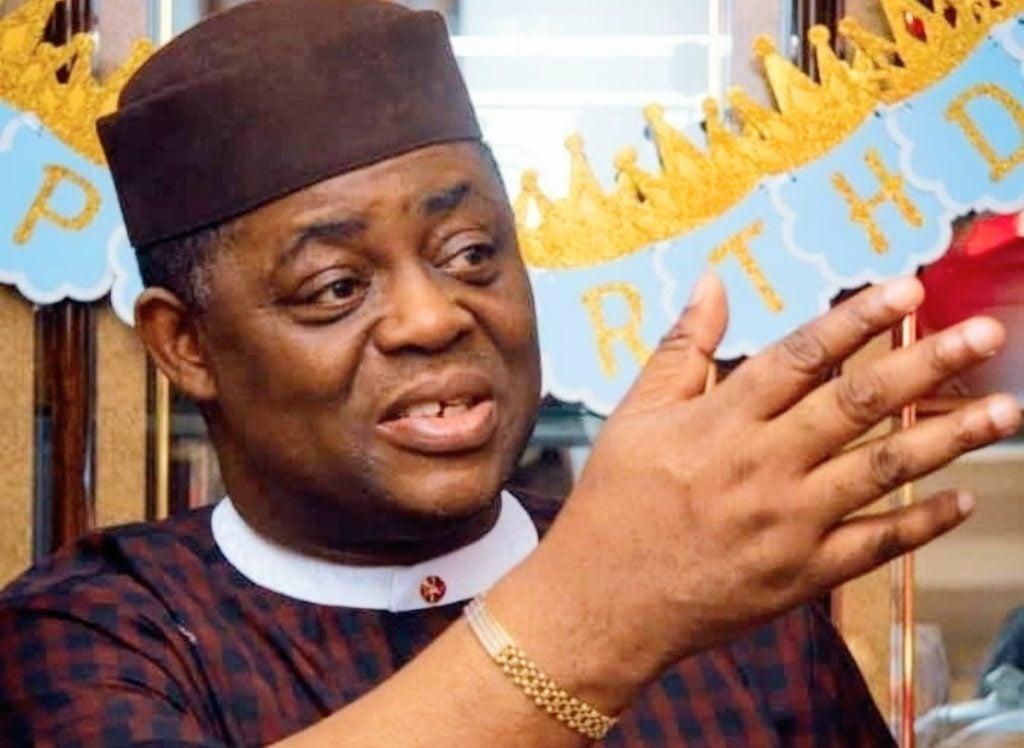News
Fani-Kayode Tackles British Envoy Over Visa Ban Threats

The Director, New Media sub-committee of the All Progressives Congress (APC) Presidential Campaign Council, Femi Fani-Kayode on Sunday reacted to the United Kingdom over controversial comments he made during the electoral season.
Recall that British Deputy High Commissioner to Nigeria, Ben Llewellyn-Jones during an interview with Nigeria Info FM on Sunday, had faulted some politicians for making “derogatory” remarks.
“Yes, let’s be specific, there were some people, like Femi Fani-Kayode, what is he saying and why is he saying it? I don’t understand. It is wrong from my perspective that he will speak on behalf of a party and that party does not distance itself from him and say stop doing that. It is wrong to say that,” Llewellyn-Jones partly said.
READ ALSO: UK Govt Slams Fani-Kayode Over Comments, Reveals 10 People On Visa Ban Watchlist
Reacting to the aforesaid comment, Fani-Kayode urged the British Deputy High Commissioner to Nigeria to “keep his dirty nose out of our internal affairs.”
These are my personal views and I am constrained to express them given the fact that one @benllewellynjo1, a misguided, mischievous and clearly unlettered Englander who does not know his place, threw away all caution and mentioned my name in his inglorious commentary.
I would…
— Femi Fani-Kayode (@realFFK) March 26, 2023
“These are my personal views and I am constrained to express them given the fact that one @benllewellynjo1, a misguided, mischievous and clearly unlettered Englander who does not know his place, threw away all caution and mentioned my name in his inglorious commentary.
“I would advise this Ben, who I am told is the Deputy High Commissioner of the UK to Nigeria, to keep his dirty nose out of our internal affairs. Nigeria stopped being a British colony 63 years ago and we need no lessons from him on how to run our affairs or conduct our politics.
READ ALSO: Naira Scarcity: Fani-Kayode Reveals What Will Happen To Emefiele If Tinubu Wins Election
“I know that his preferred candidate did not win the presidential election but that does not mean he should cross the line and take liberties with us here. I wonder who the hell he thinks he is? I am not one of those Nigerians that bows, shakes, shivers and trembles before the British or indeed any other foreigner.
“And unlike most I do not need any validation or endorsement from him or his ilk and neither can I be intimidated by his veiled threat of a visa ban. Frankly I could not care less.
“I would however take this opportunity to assure him that regardless of his views and desire to compel us to accept their godless so-called “humanist” and “libertarian” values and introduce evil practices and policies such as same-sex marriage in our country this will never be the case.
“My aversion for sodmites remains as constant as the northern star and whether he likes it or not we will never allow a sodmite to be our President. Neither will we accept lessons in decency, etiquette, what to say or how to speak from a fading British civil servant and a man that represents a nation that has committed more atrocities than perhaps any other in the history of humanity.
READ ALSO: ‘Fani-Kayode Hospitalised After DSS Grilling’
“I advise this little Englander to respect himself and remain a silent observer when it comes to the politics of the Federal Republic of Nigeria. As a nation we are not a poodle of the British and we came of age 63 years ago.
“He should be more concerned about the shrinking fortunes of a once “Great Britain” and the systemic racism, inherent injustice and insufferable arrogance that is entrenched in the British establishment and society than in the intra party politics of Nigeria.
“He should also be more concerned with the efforts of his nation to bring us one step closer to WW3 given the unfolding events in Ukraine.”
News
Court Dissolves Petitioner’s Marriage Over Lack Of Love, Care

An Area Court sitting at Centre-Igboro, Ilorin in Kwara State, on Thursday, dissolved the four-year-old marriage between Aminat Mustapha and Wahab Adeshina, following the petitioner’s insistence.
The petitioner told the court that she was no longer interested in her marriage to her husband following claims of lack of love and care.
According to the News Agency of Nigeria (NAN), while delivering ruling, the presiding judge, Mr Toyin Aluko, held that the respondent had written to the court, accepting the divorce application made by his wife.
READ ALSO:Why I Charged My Husband Money For Sex —Woman
Aluko, consequently, dissolved the marriage between the parties, and ordered the woman to observe one month iddah (waiting period) before she could remarry.
Meanwhile, the court granted custody of the two children in the marriage, ages one and three, to their mother.
He ordered the father to pay a monthly sum of N20,000 for the children’s feeding and maintenance.
The court also held that the respondent will be responsible for their education and healthcare.
Again, the court held that the father has unrestricted access to his children, but at reasonable time adding that he should be notified before any decision is taken on his children.
The judge ordered the petitioner to get a copy of the judgment and send same to the respondent.
News
Tinubu Embarks On Three-state Visit

President Bola Ahmed Tinubu will depart Abuja on Saturday on a working visit to Borno, Bauchi and Lagos.
This is contained in a statement issued by Presidential Spokesperson, Mr Bayo Onanuga, on Friday in Abuja.
While in Borno, the President will commission projects executed by the Borno State Government under Gov. Babagana Zulum, in collaboration with the Federal Government.
He will also attend the wedding ceremony of Sadeeq Sheriff, son of former Borno Governor, Sen. Ali Modu Sheriff, and his bride, Hadiza Kam Salem.
READ ALSO:Ambassadorial Nominees: Ndume Asks Tinubu To Withdraw List
From Maiduguri, Tinubu will proceed to Bauchi State to condole with the state government and the family of Sheikh Dahiru Bauchi, the renowned Islamic cleric and leader of the Tijjaniyya Muslim Brotherhood.
Sheikh Dahiru Bauchi died on Nov. 27.
After the condolence visit, the President will travel to Lagos, where he will spend the end-of-year holidays.
During his stay in Lagos, Tinubu is expected to attend several engagements, including the Eyo Festival scheduled for Dec. 27.
The festival, to be held at Tafawa Balewa Square, will honour notable personalities, including the President’s late mother, Alhaja Abibatu Mogaji, former Lagos State governors Alhaji Lateef Jakande and Chief Michael Otedola.
News
My Wife Dented My Image, Took Our Marital Crises To Radio Stations — Husband

…He ran away from home after I was delivered of twins —Wife
Grade A Customary Court sitting at Mapo, Ibadan, Oyo State, has ruled that a couple, Folaji and Ifedayo should go their different ways after it pronounced their marriage dissolved.
The court president, Mrs S.M Akintayo, who gave the judgment, stated that this was imperative to dissolve the marriage for peace to reign.
The plaintiff, Folaji, who dragged his wife to court, accused her of not loving him, always fighting him, and sometimes displaying violence.
Folaji explained that the root of their differences was Ifedayo’s bias for his mode of worship.
According to the plaintiff, he attends a white garment church, which mode of worship the defendant abhors and therefore refused to attend services with him.
Folaji also said that Ifedayo concealed from him the fact that she was suffering from a particular ailment, which he became aware of after she was advised at the hospital to carry out series of tests.
Folaji stated that the differences between him and his wife degenerated to the level that he became a regular face at the police station and also at radio stations, where his wife took their matters to.
READ ALSO:‘My Husband Kept Coffin Under Our Bed, Planned To Use Our Child For Ritual’
The plaintiff told the court that the defendant had done a lot of damage to his image, and thus prayed the court to put an end to their relationship so that he could pick up the pieces of his life.
The plaintiff sought easy access to their children and promised to give them feeding allowance weekly.
He further requested an order restraining his wife from threatening him and from interfering with his private life.
Ifedayo, in her response, agreed that their union be dissolved.
She stated that her husband was inhumane and that he packed out of their house before she was discharged from the hospital after she put to bed a set of twins.
The defendant further said that the plaintiff had never visited her and their children since he walked out of their marriage.
According to her, her husband sent her N20,000 through his counsel after he dragged her to court, but that she declined it because it was a ridiculous amount to feed a set of twins.
Folaji, in his testimony, said: “My lord, my wife, and I had a proper wedding, and I paid her bride price.
“I expected my wife to be submissive to me and do my binding, but the reverse is the case.
“My wife is stubborn and troublesome.
READ ALSO:My Husband Felt Insecure After I Got A Job, Accused Me Of Infidelity —Wife
“She swore never to attend my church because it’s a white garment church and that she loathes our way of worship.
“The more I encouraged her to attend, the more she kept her distance.
“She later reluctantly agreed to attend service once a month.
“My wife is secretive. She hid from me for years the fact that she was nursing an ailment. I only became aware of this when the doctor confirmed it after she went through a series of tests when she took ill.
“My wife, rather than being remorseful, decided to make life tough for me.
“She became troublesome and never ceased to fight me.
“She is violent and always hit and harmed me with any dangerous objects within her reach.
“We always dragged ourselves to the police station where we became a regular face.
“My wife, determined to dent my image, took our issues to radio stations where I was invited and our differences were aired.
READ ALSO:My Husband Felt Insecure After I Got A Job, Accused Me Of Infidelity —Wife
“I walked out of our marriage when I could no longer tolerate my wife’s misbehaviour.
“She reported me again at the welfare office and, after mediating in our differences, I was asked to provide her with foodstuff and not money, which I did on a regular basis.
“But she has insisted that I would not have rest of mind.
“I pray this court to dissolve our marriage and grant me free access to our children. I promise to make provision for their upkeep on a weekly basis.
“I further request an order restraining my wife from threatening and interfering with my private life.”
Ifedayo, in her response, said: “I agree that our marriage be dissolved. My husband is inhumane and has no conscience, which were the causes of the crisis we experienced in our marriage.
“I was admitted in the hospital to be delivered of our set of twins, but I returned to meet an empty house. My husband deserted me and our newborn children.
READ ALSO:My Husband Shows His Other Wives More Affection, Woman Tells Court
“He never checked on them nor gave anything for their upkeep. He only gave them N20,000 of recent through his counsel after he came to court.
“I rejected the money because such an amount can not feed sufficiently two children of their age, not to mention other needs.
“I plead that the court grant me custody of our children and make my husband responsible for their upkeep.
“I want him to give attention to their feeding and pay their school fees as and when due.
“He should likewise be available any time they need medical attention.”
Giving her judgment, Mrs Akintayo said although both had a valid customary marriage and bride price was paid, the court had no choice than to grant their prayers of divorce since they now express their disinterest in it.
Akintayo ruled that they were no longer husband and wife.
She granted custody of their children to the defendant, stating that they were still minors in need of motherly care.
The defendant was granted access to their children on a weekly basis while he was ordered to be responsible for their welfare.

 News4 days ago
News4 days agoWage Dispute: Court Orders PSG To Pay Mbappe €61 Million

 Headline4 days ago
Headline4 days agoAircraft Crashes In Owerri With Four Persons Onboard

 Sports4 days ago
Sports4 days agoJUST IN: Dembélé Named FIFA Best Men’s Player, Bonmatí Wins Women’s Award

 Metro3 days ago
Metro3 days agoAlleged Organ Harvesting: Bereaved Families Rush To Check Corpses

 Business4 days ago
Business4 days ago9th FirstBank Digital Xperience Centre Launched In UNIBEN

 Business4 days ago
Business4 days agoCBN Revokes Licences Of Aso Savings, Union Homes As NDIC Begins Deposit Payments

 News4 days ago
News4 days agoOkpebholo Presents ₦939.85bn ‘Budget Of Hope, Growth’ To Edo Assembly

 News4 days ago
News4 days agoTrump Places Nigeria, 14 Others On Partial Travel Restrictions To US

 News3 days ago
News3 days agoForest Reserve: Okpebholo Broker Peace Between Host Communities, Investors

 News4 days ago
News4 days agoOPINION: Man-of-the-people, Man-of-himself




























